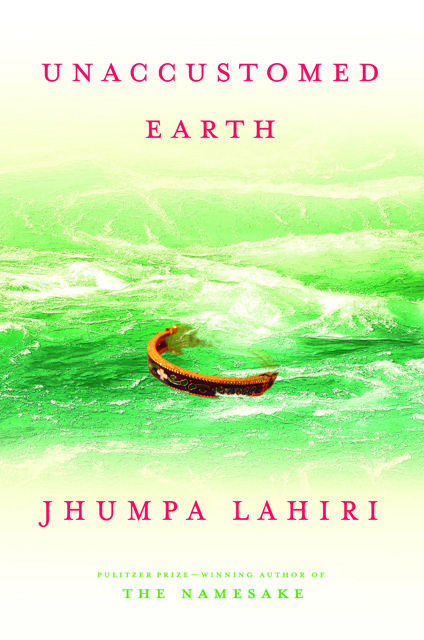
Jhumpa Lahiri – Immigrant stories…
With deft, intricate brush-strokes Jhumpa Lahiri creates characters that are so real you could swear you recognize them, you know them, or at least people like them. Sometimes you even recognize bits of yourself, your own conflicts in the stories that she weaves about transplanted men and women and their splintered lives.
Lahiri, in a way, was probably preparing for these stories of dislocation and self discovery all her life. Born in England in 1967, she was raised in Rhode Island, and yet Calcutta was the unseen presence, always there in the drawing room and the kitchen, as it is for so many immigrants. As the child of Bengali parents, life was a constant balancing act, of straddling two worlds, of reconciling her Bengali roots with her American reality.
Of those early days, Lahiri has said, “As a young child, I felt that that the Indian part of me was unacknowledged and therefore somehow negated, by my American environment, and vice versa. I felt that I led two very separate lives.” These conflicting emotions became the impetus for her writing, and she has always written about exiles, about people caught between cultures and continents.
Jhumpa Lahiri – The Namesake
In fact, her novel ‘The Namesake’ chronicled the heartbreak and struggle of becoming American, of giving up something to get something else. Like the protagonist of the book, Gogol Ganguli, she too exchanged her given ‘good name’ –Nilanjana Sudeshna – for her pet name, Jhumpa; something which would probably never have been done in Bengal, where personal names are for private use, and formal names for the public.
She has noted that when she was growing up, she was often asked where she was from. If she said Rhode Island, the answer didn’t seem to satisfy people: “Alternatively, if I say I’m from India, a place where I was not born and have never lived, this is also inaccurate. It bothers me less now. But it bothered me growing up, the feeling that there was no single place to which I fully belonged.”
Jhumpa Lahiri steeped herself in the written word: she received a B.A. in English literature from Barnard College, and from Boston University she received a triple MA in English, creative writing and comparative studies in Literature and the Arts, and a PhD in Renaissance Studies. She has also taught creative writing at Boston University and the Rhode Island School of Design
Interpreter of Maladies
Her literary star dawned overnight when her debut collection of short stories, ‘Interpreter of Maladies’, won the 2000 Pulitzer Prize for fiction and became an instant best-seller which was translated into 30 languages. It also received the PEN/Hemingway Award, the New Yorker Debut of the Year award, an American Academy of Arts and Letters Addison Metcalf Award, and was nominated for the Los Angeles Times Book Prize. She received the Guggenheim Fellowship in 2002 and a grant from the National Endowment for the Arts in 2005.
Her first novel, ‘The Namesake’ followed the journey of Ashima and Ashoke Ganguli to America, and conveys beautifully that vague feeling of malaise, of having lost something that many immigrants seem to feel. Ashima described it as “a sort of lifelong pregnancy – a perpetual wait, a constant burden, a continuous feeling out of sorts.” The book went on to sell over a million copies and was made into a critically acclaimed and well-received movie by Mira Nair, starring Tabu, Irrfan Khan, and Kal Penn as the lead character, Gogol Ganguli.
Jhumpa Lahiri’s Unaccustomed Earth
So who is Jhumpa Lahiri and why do her words resonate with readers everywhere, irrespective of race or nationality? A master story-teller, her stories may be about Bengalis in America or India, but the griefs, the needs and the situations are so universal that they hit home, they are about the human condition.
Lahiri and her husband Alberto Vourvoulias-Bush, a journalist who was earlier deputy editor of Time Latin America, live in Brooklyn with their two children Octavio and Noor, to whom she’s dedicated her latest book ‘Unaccustomed Earth’, a collection of short stories which is about love, loss and families.
At a recent black tie gala for a nonprofit cause with the usual churning crowds, Lahiri was there, looking strikingly beautiful but also there simply because she had committed to close friends to be there. A very private person, she’s reserved rather than gregarious. Indeed, it’s hard to get her to talk about her personal life, but she came close to it when she spoke with Charlie Rose recently on his TV show about how she’s more comfortable observing life, rather than participating in it.
“That’s really always a part of me, the fact that I am very comfortable removing myself from actual experience and watching and thinking and recording as an audience member,” she said. “It is hard for me to sometimes fully accept that I am actually also on the stage of life and that my life is up there along with everybody else’s life, and that I’m living my life. It’s easier for me – it’s more of a comfortable position for me to think, as I’ve always thought ever since I was small, that life is something that happens to other people.”
An elegant writer, Lahiri is a minimalist who manages to say in a few words what might take others pages of high drama. As she told Isaac Chotiner of Atlantic.com, “I like it to be plain. It appeals to me more. There’s form and there’s function and I have never been a fan of just form. My husband and I always have this argument because we go shopping for furniture and he always looks at chairs that are spectacular and beautiful and unusual, and I never want to get a chair if it isn’t comfortable. I don’t want to sit around and have my language just be beautiful.”
In ‘Unaccustomed Earth’, you meet people you won’t forget easily because you continue to think about them long after you’ve put away the book. It’s about families that are coming together and about families unraveling, about death and birth.
In the title story, a father visits his daughter after the death of his wife and forms a bond with his little grandson as they tend the neglected garden together. He has a secret but things are left unsaid. It’s a story that is achingly poignant yet common to families everywhere; in the story Hell-Heaven, who will not feel the ignominy of unrequited passion or reel over the surprise tinderbox ending? In each of the 8 layered stories, the grief and even the joy of the moment are gradually revealed, as they are so often in life.
“Lahiri handles her characters without leaving any fingerprints. She allows them to grow as if unguided, as if she were accompanying them rather than training them through the espalier of her narration,” writes in The International Herald Tribune. “Reading her stories is like watching time-lapse nature videos of different plants, each with its own inherent growth cycle, breaking through the soil, spreading into bloom or collapsing back to earth.”
Apt words, for Jhumpa Lahiri is living her life in America even as she lives it vicariously a second time through her words in her beautifully crafted stories. Taking root in unaccustomed soil, her stories have the power to touch the heart, to be always truthful.
© Lavina Melwani


2 Comments
Yoshay, I really appreciate your wonderful comments. Jhumpa is a very special writer and we both have admiration for her work in common!
Absolutely brilliant article. Although I may not have expressed this earlier, I must say that I really, really enjoy reading your articles in this blog. Reading about Jhumpa here really gave depth to my knowledge about this prolific author. Thank you Lavina!